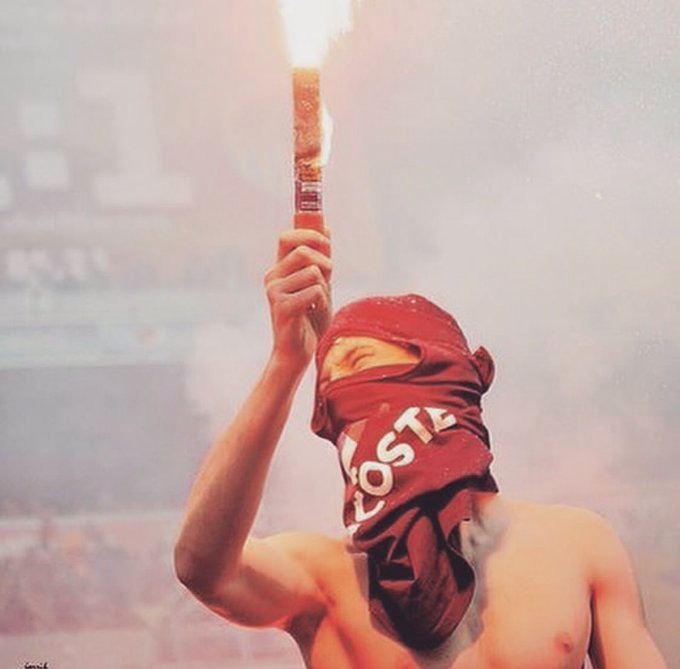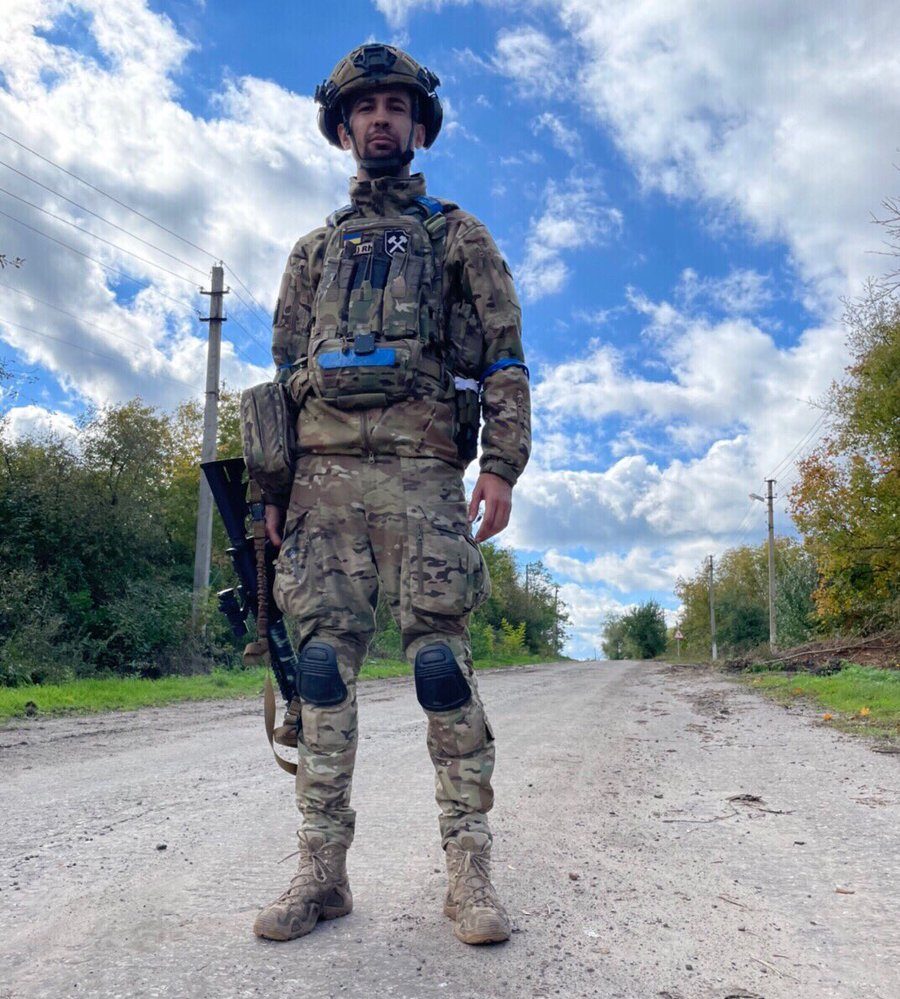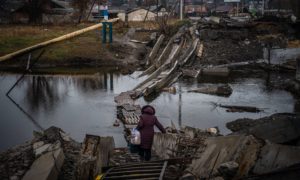“Tottenham were hard. They fought well.” Vitalii Ovcharenko pauses and sips his tea, having earlier refused my offer of a beer. “I remember it clearly. There weren’t many of them and they were heavily watched by the police. But, still, they managed to give the police the slip and get into the city, where we were already hunting them. We always tried to fight foreign fans who came to Donetsk. Finally, our scouts informed us where they were: about 10-15 hooligans had been seen in the centre, and we attacked. I must give them credit — the Tottenham fans were tougher than Celtic and Manchester United, especially in terms of their morality.”
What does he mean by “morality”? “Being an effective hooligan is about many things, but in the end it comes down to how brave you are, and from this internal force — we call it a ‘moral’ force — comes your physical success. In that respect, football hooliganism is very similar to fighting in a war.”
Vitalii is unique, even among the variegated pool of characters I have met in almost a decade of covering Ukraine. A Special Forces soldier, a social media guru responsible for reaching out to the Russians, and an intellectual with a PhD in “the political, economic and social relations between Ukraine and Scandinavia”, he is also a former leading member of Shakhtar Donetsk’s football hooligan firm, “Sever-8”.
Vitalii doesn’t look like your average member of Ukrainian infantry, or indeed any member of a football gang. Tall, thin, delicate-featured, and wearing a black roll neck, he looks more like a French existentialist. But now he is very much a soldier — albeit an odd one.
He first joined up in 2014 for a year, before returning at the start of last year’s all-out invasion, when the Russians were just miles from Kyiv. Along with a small group of comrades, he drove through the forests deep into occupied territory to conduct reconnaissance. In those early days, it was particularly dangerous: no-one knew where or exactly how many Russian soldiers there were. But, through some help from Ukrainian citizens, he eventually managed to get their coordinates and their bases were destroyed by Ukrainian artillery. “Yes, I was only a transmitter of information,” he says. “But it was very nice to learn later how many Russian occupiers were killed as a result of my work.”
But it soon emerged that he could do so much more than pick off occupying forces. Vitalii was born in the Donetsk region and lived there until just before the beginning of the Russian occupation, in 2014. Before the war, he explains, it was “morally” difficult to fight in the places where you lived when you were a child. But now this is a strength; unlike many of his army friends from other regions, he understands the local history and nuances of Donetsk. “I know what I am fighting for as a soldier and fighting for as a social activist, because every day I see the broken villages and cities of my region. I don’t need to talk about patriotism or love for the motherland. Every house destroyed by the Russians says more than all the phrases about patriotism ever could.”

Russian propaganda has had an indoctrinating effect on the people there — after all, children who were eight years old in 2014 are now almost 18. But the more time that has passed, the more people understand what is happening, and recognise the changes around them. They can remember an optimistic city, with a football team that won league championships. But now much of the city is run down; the expensive hotels bustling with tourists are just a memory.
It is these memories of Donetsk’s potential which drive Vitalii, who, alongside his hooliganism, was a social activist before the war — he remembers protesting the building of a new municipality building in a park. He was always active, always mobilising. So since the start of the war, he has never been just a soldier. Straightaway, he started making videos and putting them on YouTube, talking to people inside occupied Donetsk. And thanks to his local knowledge, and strong Donetsk accent, they were successful. He could speak to those inside in a language they understand, fusing military communications with his personal stripe of activism. “No matter how bad the situation is, always write and show your position online. Show your opinion. Because even one tweet can change a lot. I also started to bring more of my personal life online, so that people can see that I am not just an account, but first of all, a normal person.”
He remembers making a YouTube video just before February of last year — without, he says, much “strategic thought” — to try to help students inside Donetsk go to university in Ukraine-controlled territory. He asked them to write in if they were interested, not expecting many replies. But, though the Russians have tried to block YouTube in the occupied territories, locals are able to bypass it, download his videos, and share them on other channels such as Telegram. And then they started writing in. He was shocked, but got to work, contacting friends at his old university, which had moved its site to Vinnytsia in central Ukraine. He managed to get a dozen kids out and sent them to study there. “It was surreal,” he remembers. “They had lived all their lives with a curfew, and never did anything in the evenings; they didn’t even know what Apple Pay was. Most of the youth would like to leave the occupied areas, whether to Russia or Ukraine. They’ve had enough.”
Then there is his military communications work, which is almost always targeted at those living under Russian rule inside the territories. “Friends and Ukrainians who live under occupation,” reads one Facebook post. “If you have information on the locations of Russian occupation troops; locations of base equipment, the deployment of soldiers and so on — write to my Twitter or Facebook or Telegram. Anonymity and cooperation guaranteed!”

Russia, of course, does its best to maintain total informational control of occupied Ukraine. Much of what goes on inside, especially in terms of Ukrainian resistance, goes unreported. One of his greatest communications victories, was helping to break through the Russian comms siege of Donetsk. People inside were protesting, he told me, and it was only his tweets that broke the informational silence around what was happening on the ground.
In a similar way, he tries to maintain links with his old contacts inside — though it’s not always successful. One friend, he says, became a pro-Russian separatist after falling for the usual Russian propaganda. “That the memory of the grandfathers who fought in the Second World War would be marginalised by Kyiv following the 2014 Euromaidan Revolution; that the Russian language was not respected in Ukraine. He became impossible to get through to.”
Things, though, changed after the first HIMARS rockets struck Donetsk. Previously the Russians, Vitalii explains, felt “invulnerable” in those areas. They believed “nobody…could touch them”. But, the day after Ukraine’s rockets started to fall, one old friend called him. “‘Ok’, he told me. ‘I’ll give you some insights from time to time so when you come and liberate us, you’ll put in a good word for me and I won’t be severely punished, okay?’” He can’t say who they are, but claims some of those helping him are in influential positions.
It’s very much a portfolio military career, and I ask him how he thinks his days as a hooligan have influenced it. “Football hooliganism taught me a lot about how to prepare for war, and what to do in war,” he replies. “Most important, by far, is preparing oneself before battle. It’s normal to be afraid before you fight, and through hooliganism, I learned how to understand and manage the fear. Because the emotions before a fight and before a shooting battle are quite similar. When you are on the bus going to the operation or in the car to the match, there is no turning back. On each occasion, you need to explain to yourself that you are already there; you need to survive the three or four days at the front or three or four hours at the game, and to be as organised as possible. And then you need to think about what you are going to do when you return. That is key.”
Being able to manage people, he added, especially in terms of correctly assessing what they can and cannot do in extreme situations, when a decision must be made in seconds, is also vital to both disciplines. As is the ability to organise and motivate large groups — some people need to be taken aside and spoken to; some need to be shouted at.
For Vitalii, hooliganism is not about beer and fighting, but something else. Ukrainian football hooligans, he explains, do not try to kill each other. The main thing is to win in a fair fight. No weapons are used, and if anyone ever did they’d be “punished” by their own fans. He often became friends with representatives of opposing clubs — though not on match days. “I am proud that Donetsk hooligans came to the defence of EuroMaidan in Donetsk from pro-government thugs; I am proud that Shakhtar hooligans took part in the EuroMaidan events in Kyiv; I am proud that Shakhtar’s hooligans were among the first to go to defend Ukraine against Russia,” he says. “When society thought we were just about beer and fighting, we showed that we love Ukraine, and the values of freedom, which we are ready to die for. Among the hooligans of Shakhtar there are already 10 boys who have died in the war.”
As our meeting draws to a close, I have one final question.
“Arsenal?” He replies thoughtfully. “No, we never fought them. I don’t remember them ever showing up.”
Disclaimer
Some of the posts we share are controversial and we do not necessarily agree with them in the whole extend. Sometimes we agree with the content or part of it but we do not agree with the narration or language. Nevertheless we find them somehow interesting, valuable and/or informative or we share them, because we strongly believe in freedom of speech, free press and journalism. We strongly encourage you to have a critical approach to all the content, do your own research and analysis to build your own opinion.
We would be glad to have your feedback.
Source: UnHerd Read the original article here: https://unherd.com/


